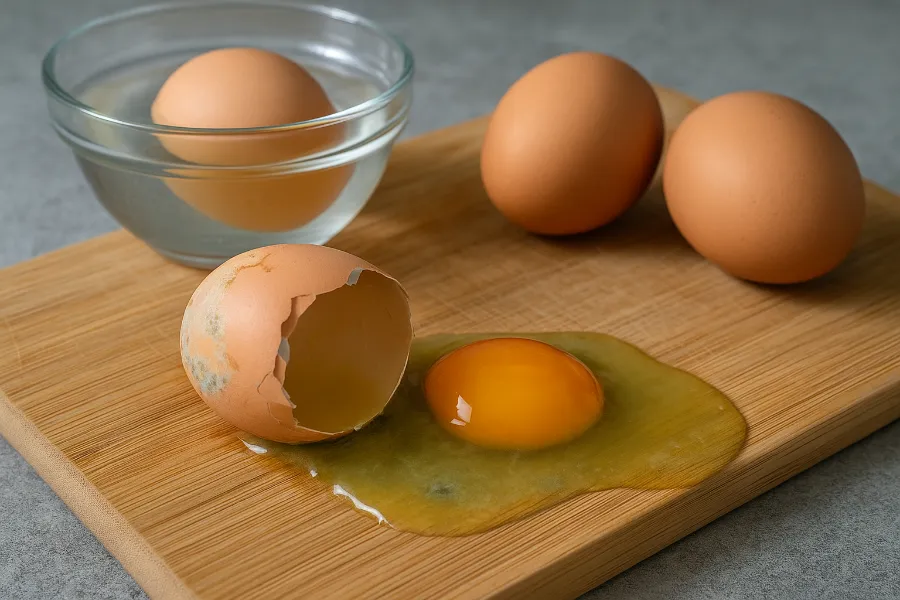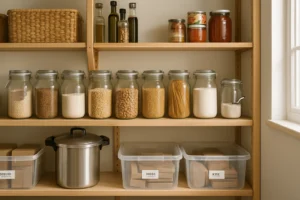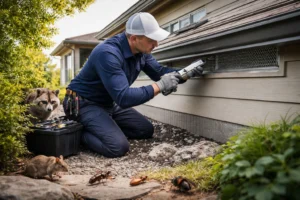I don’t know about you, but every time I reach into my fridge and pull out a carton of eggs, I pause and wonder: what’s the deal with egg expiration? And more importantly can I still use them? I used to toss eggs once they hit the “expiration” or “best by” date printed on the carton, but after digging into the science and testing methods, I realized there’s more nuance than meets the eye. In this post, I’ll walk you through what “egg expiration” truly means, how long you can realistically use eggs, how to test them, and how to avoid ending up with bad eggs or rotten eggs in your life.

Do Eggs Expire in the Fridge?
Short answer: yes. But not as fast or definitively as you might think.
In the U.S., eggs sold in supermarkets are washed and refrigerated during processing, which means their natural protective coating is removed. That makes them more susceptible to bacteria if they’re left out of the fridge for too long. Once eggs are in your fridge and kept at a temperature of 40°F (4°C) or lower, they can last several weeks beyond the date on the carton.
So, while we say “egg expiration,” it’s really about quality decline over time and increased risk—not an instant and total cutoff. The fridge dramatically slows down spoilage processes, but doesn’t stop them entirely.
Can You Eat Eggs After Expiration Date?
I’ll admit: I was always too scared to crack open an egg once its date passed. But once I learned that those dates are mostly about quality, not safety, I changed my tune.
Most egg cartons use terms like “sell by,” “best by,” or “expiration date.” These are guidelines for stores or for peak freshness—not necessarily the end of safety. According to the American Egg Board and food safety sources, properly refrigerated eggs can be eaten 3 to 5 weeks after the pack/expiration date, as long as they pass freshness tests.
Of course, “past the date” doesn’t mean “automatically safe.” If an egg smells wrong, shows weird colors, or fails the float test, toss it. Safety always comes first.
How to Tell If Eggs Are Still Good
This is my favorite part where I get hands-on and test my eggs before cooking anything. Here are the methods I rely on:
1. Smell Test
Crack the egg into a small bowl or plate. If it smells like sulfur or rotten eggs even faintly don’t risk it. A fresh egg should have no smell.
2. Float Test
Fill a bowl or glass with cold water and gently drop the egg in:
- Fresh egg: sinks and lies flat
- Older but okay: stands upright on the bottom
- Spoiled/rotten: floats
A floating egg typically means gas has built up inside, which is a red flag.
3. Visual & Texture Check
Inspect the shell before cracking. Slimy residue, cracks, or powdery mold are bad signs. After cracking:
- Whites should be thick or slightly cloudy (not super watery)
- Yolks should hold shape
- Any odd color pink, green, milky means trouble
4. The Shake Test
Hold the egg up to your ear and shake gently. If you hear sloshing, the interior is breaking down. Fresh eggs usually make no sound.
Using these methods together gives you a good sense of how to tell if eggs are still good—even if the carton date has passed.
How Long Do Eggs Last in the Fridge?
This is where understanding real timelines comes in handy. Below is a breakdown of how long different types of eggs last in a properly chilled fridge:
| Egg Type / State | Approximate Shelf Life in Refrigerator | Notes / Caveats |
|---|---|---|
| Raw eggs in shell | 3 – 5 weeks beyond pack date | This is when stored properly at ≤ 40°F |
| Raw eggs removed from shell (yolks or whites) | 2 – 4 days | Use airtight containers |
| Hard-boiled eggs (in shell) | ~1 week | After cooking, protective coating is gone |
| Peeled hard-boiled eggs | Same day ideally | They degrade faster once shells are off |
One thing I learned: the “best by” or “use by” date on cartons is often more conservative than reality, especially when eggs are handled well.
Also: make sure your fridge is consistently cold (≤ 40°F). The door shelves often fluctuate too much. Store eggs in the carton on an inside shelf where the temperature is steadier.
Bad Eggs
Let’s talk about bad eggs—those borderline ones that aren’t quite fully rotten, but have lost quality.
Bad eggs might:
- Have weaker shells or small cracks
- Show whites that are thinner or more watery
- Have yolks that flatten easily
- Possibly smell faintly off
They might still be safe to cook, especially if fully cooked, but they won’t taste or perform as well in delicate dishes (like poaching or baking). If I see any doubt in smell or texture, I won’t use them in dishes where the egg is the star.

Rotten Eggs
This is the level where it’s not worth taking a chance. Rotten eggs are unmistakable:
- Strong sulfur / rotten smell when cracked
- Color changes (pink, green, iridescent)
- Egg floats in water
- Shells that feel slimy or look moldy
If I hit any of those signs, it’s straight to the trash. Rotten eggs are dangerous—they can harbor harmful Pathogens like Salmonella, especially if they’ve been stored poorly or beyond safe limits.
Egg Spoilage: Why It Happens & How to Prevent It
Spoilage doesn’t just happen. It’s a process influenced by how eggs are handled, stored, and aged. Here’s what causes egg spoilage, and what you can do to slow it.
Causes of Egg Spoilage
- Bacterial invasion: Once eggs lose their shell’s protective layer—like from washing or micro-cracks—bacteria can penetrate.
- Temperature fluctuations: Moving eggs from warm to cold (or vice versa) promotes condensation inside the shell, making it easier for bacteria to grow.
- Moisture & humidity: High humidity weakens shells and allows microorganisms to pass through.
- Time: Simply put, eggs degrade over time. Whites thin, yolks flatten, membranes weaken.
- Physical damage: Even small hairline cracks can open a route for contamination.
How I Prevent Egg Spoilage (In My Kitchen)
- I never wash eggs immediately—I wait until I’m ready to use them (washing removes the natural protective cuticle).
- I store eggs in their original carton, pointing downwards, placed on a cold, inner shelf—not the door.
- I bring eggs home and refrigerate them immediately, without letting them sit out for long.
- I write the date of purchase on the carton to help me rotate them (oldest first).
- For eggs I know I won’t use soon, I freeze them (more on that in a moment).
- I never crack eggs back into the shell container—always into a separate clean bowl first.
- I check eggs with the float + smell test before I use them.
By incorporating just a few of these habits, spoilage slows and safety improves.
Freezing Eggs (as Backup)
If I ever find myself with more eggs than I can eat in a few weeks, I freeze some. But you’ve got to do it right:
- Don’t freeze eggs in their shells. Instead, crack and beat them.
- For yolks, add a pinch of salt or sugar per a small batch to prevent gelation.
- Store in freezer-safe containers or ice cube trays.
- Label with date and whether it’s whole egg, yolk, or white.
- Use thawed eggs in fully cooked dishes not raw preparations.
Eggs (out of shell) can generally last up to a year in the freezer.
Once thawed, treat them like fresh eggs but use them sooner rather than later.

My Final Thoughts (From Someone Who Codes for Breakfast)
Understanding egg expiration doesn’t have to feel scary or overly technical. Yes, eggs do “expire,” but what that really means is a gradual decline in quality and increased risk over time not an instant “bad” switch. The magic trick is giving yourself a buffer with good storage habits, simple tests, and smart usage.
If you follow:
- Proper refrigeration
- The smell / float / visual / shake tests
- Smart rotation and labeling
- Freezing as a backup
You’ll crack open safe, tasty eggs rather than nervous ones. I’ve personally saved dozens of eggs from the bin just by doing these checks. And more importantly, I’ve avoided the heartbreak (and stomach ache) of eating a rotten one.
FAQs
Yes, but not right away. Refrigerated eggs usually last 3–5 weeks beyond the carton date if kept at 40°F (4°C) or lower.
Yes, if stored properly. Eggs often remain safe for weeks past the date as long as they pass freshness tests.
Try the sniff, float, and visual tests. Fresh eggs sink and smell neutral, while spoiled ones float or smell bad.
Raw in-shell eggs last about 3–5 weeks, while hard-boiled eggs keep for about one week. Out-of-shell yolks or whites last 2–4 days.
Watery whites, flat yolks, or faint off-odors are signs. Bad eggs may not be fully rotten but aren’t ideal for cooking.
Rotten eggs often develop from bacterial growth, cracks, or improper storage. They’ll have a strong sulfur smell and odd colors.
Keep eggs in their carton, store them in the coldest part of the fridge, and avoid washing until ready to use. Rotate older eggs first.













